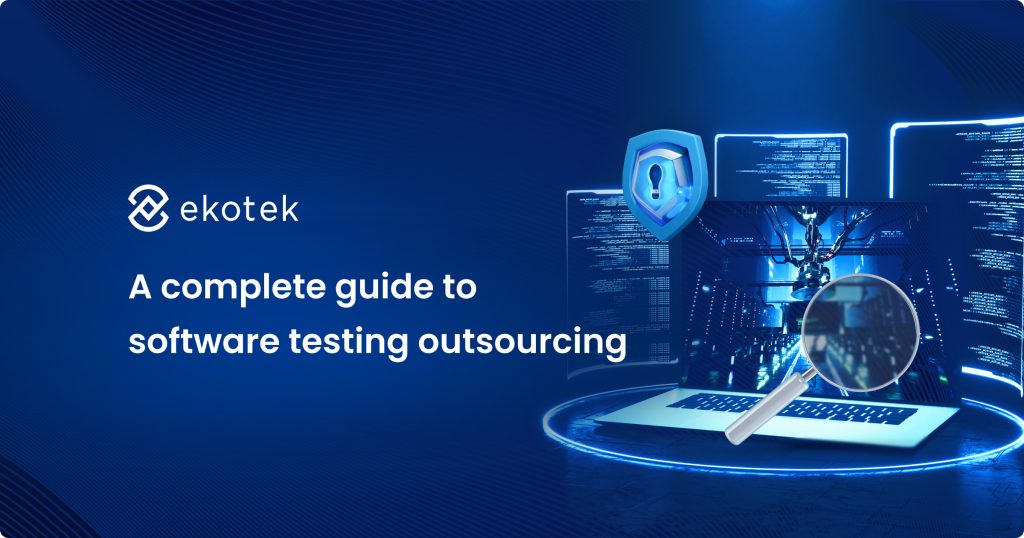Software testing plays a crucial role in ensuring the quality and functionality of software applications. However, many companies face challenges in allocating sufficient resources and expertise for in-house software testing. This is where software testing outsourcing comes into play. If you’re still unsure whether outsourcing software testing is the right decision for your business, you’ve come to the right place! In this blog, we will explore the concept of software testing outsourcing and how to choose a software outsourcing vendor.
What is software testing outsourcing?
Software testing outsourcing refers to the practice of delegating software testing activities to external service providers. It involves engaging a third-party vendor or a dedicated software testing company to perform various testing activities, such as functional testing, performance testing, security testing, and usability testing. This allows organizations to leverage the expertise and experience of specialized testing professionals, thus ensuring a comprehensive and reliable testing process.
Why outsource software testing?
Outsourcing software testing brings a multitude of benefits to organizations, providing them with a competitive edge.
- Access to expertise and tools:
 By outsourcing software testing, companies gain access to a pool of experienced testing professionals who possess specialized skills and knowledge. These professionals have extensive experience across various industries and technologies, enabling them to bring valuable insights and best practices to the testing process. Their expertise ensures thorough test coverage, identification of critical issues, and the implementation of effective testing strategies.
By outsourcing software testing, companies gain access to a pool of experienced testing professionals who possess specialized skills and knowledge. These professionals have extensive experience across various industries and technologies, enabling them to bring valuable insights and best practices to the testing process. Their expertise ensures thorough test coverage, identification of critical issues, and the implementation of effective testing strategies.
Moreover, outsourcing partners often have access to cutting-edge testing tools and frameworks. For simulating real-world user loads and measuring the performance and scalability of their software applications, they can use Apache JMeter or Load Runner. There are other tools for security testing like OWASP ZAP and Burp Suite, or usability testing, such as UserTesting and UsabilityHub. These tools help streamline the testing process, increase efficiency, and enhance the accuracy of test results.
📌Read more: Manual Testing vs. Automation Testing: Understand the differences
- Improved software quality:
Dedicated testing teams approach testing from an unbiased perspective, providing a fresh set of eyes to identify defects, vulnerabilities, and usability issues that may be overlooked internally. They follow industry-standard testing methodologies and employ rigorous testing techniques to ensure that the software meets the highest quality standards.
Outsourcing vendors also have a strong focus on quality assurance and adopt robust testing processes. They conduct comprehensive functional testing, performance testing, security testing, and usability testing to identify and rectify any issues, thereby delivering software that is reliable, stable, and user-friendly.
- Cost savings:
When compared to building an in-house testing team, outsourcing minimizes the need for upfront investments in infrastructure, testing tools, and hiring and training testers. It also eliminates the ongoing costs associated with maintaining a dedicated testing department, such as salaries, benefits, and overhead expenses.
Additionally, outsourcing allows organizations to leverage the scalability of testing resources. They can flexibly adjust the size of the testing team based on project requirements, thereby avoiding the fixed costs associated with maintaining an in-house team during periods of low testing demand.
📌Read more: Software development company in Vietnam can help startups save costs
- Focus on core competencies:
Testing is a specialized discipline that requires dedicated time, effort, and expertise. By entrusting testing responsibilities to external experts, organizations can allocate their internal resources to activities that directly contribute to their core business objectives, such as product development, innovation, and customer engagement. This helps enhance overall productivity and efficiency.
- Faster time-to-market:
Outsourcing software testing accelerates the software development lifecycle and enables faster time-to-market. Testing service providers have dedicated testing teams with the required expertise and resources to conduct testing activities promptly and efficiently. Their streamlined testing processes and efficient allocation of resources ensure that testing cycles are completed within the desired timelines.
Outsource software testing cost
While outsourcing can be cost-effective, it is important to understand the various cost factors involved. The cost of outsourcing software testing depends on several factors, including the complexity of the software, the scope of testing required, the number of testing cycles, and the size of the testing team.
- The complexity of the software: Complex projects with intricate functionalities, multiple platforms, or advanced technologies may require more extensive testing efforts, leading to higher costs. The level of complexity determines the amount of time, resources, and expertise required for testing.
- Scope of testing: The scope of testing required also impacts the cost. The scope includes factors such as the number of test cases, the depth of test coverage, and the types of testing needed (functional testing, performance testing, security testing, usability testing, etc.). Larger test scopes with comprehensive coverage will require more time and effort, resulting in higher costs.
- Number of testing cycles: Some projects may require multiple testing iterations to ensure thorough validation and bug fixing. Each testing cycle involves executing test cases, analyzing results, and providing feedback for improvements. The more testing cycles needed, the higher the cost.
- Size of the testing team: A larger testing team can handle a higher volume of testing activities and deliver results faster. However, a larger team also implies higher costs due to increased resources and coordination efforts.
- The testing team’s location: If you contract with a vendor in the United States or some high labor cost countries, the cost will be huge. For example, the average hourly rate for a QA tester in the United States is almost $100 – $250 per hour. Asian countries like India and Vietnam offer affordable hourly rates. It ranges from $20-$50. This cost advantage particularly appeals to businesses looking to reduce operational expenses while maintaining high-quality work.
 Offshore software testing services – the most favorite model
Offshore software testing services – the most favorite model
Among the 3 popular outsourcing models, namely onshore, nearshore, and offshore, offshore software testing services have gained significant popularity. Offshore outsourcing involves engaging a service provider located in a different country or geographical region. This model offers several advantages, including cost savings, access to a global talent pool, and round-the-clock testing capabilities. Offshore service providers often operate in different time zones, allowing uninterrupted testing and faster turnaround times.
- Cost advantages: Companies can leverage the lower labor costs in offshore locations, such as India, or Vietnam, compared to their domestic markets. This cost difference allows organizations to access highly skilled testing professionals at a more affordable rate while maintaining quality standards.
- Global talent pool: Offshore software testing services provide access to a diverse and extensive talent pool. Offshore testing vendors often have teams of experienced and certified testers who specialize in various domains and technologies. This expertise and specialization enable organizations to benefit from a broader range of testing knowledge and best practices.
- Scalability and flexibility: The offshore software testing model offers scalability and flexibility to accommodate changing project requirements. Organizations can easily scale the testing team up or down based on the project’s needs, allowing for efficient resource allocation without the need for long-term commitments. This flexibility is particularly beneficial for projects with fluctuating demands or tight deadlines.
- Cultural and language compatibility: Many offshore testing vendors have experience in working with clients from different countries and cultures. They understand the importance of clear communication and effective collaboration. Offshore teams often have proficiency in multiple languages, ensuring smooth and efficient communication between teams, minimizing misunderstandings, and promoting effective project coordination.
Best practices
When considering software testing outsourcing, there are several best practices that organizations should follow to ensure a successful engagement. These practices focus on effective communication, clear project goals, and robust contractual agreements. By adhering to these practices, companies can maximize the benefits of outsourcing and mitigate potential risks.
- Establish clear communication channels:
It is important to establish communication channels that enable seamless collaboration between the outsourcing vendor and the internal development team. Regular meetings, both online and in-person if possible, should be scheduled to discuss project updates, address concerns, and ensure alignment.
In addition to meetings, progress reports should be shared regularly. These reports should provide detailed information about the testing progress, identified issues, and any changes in the project scope or timeline. Transparent documentation, such as test plans, test cases, and bug reports, should be shared between the parties to ensure a common understanding of the project requirements and goals.
- Define clear project goals and deliverables:
Both the outsourcing vendor and the company should have a shared understanding of the expected outcomes and the specific testing activities that need to be performed. Project goals should be specific, measurable, achievable, relevant, and time-bound (SMART). This ensures that everyone involved understands the desired results and can work towards achieving them. Additionally, defining clear deliverables helps in monitoring and evaluating the progress of the testing process.
- Establish metrics for evaluation:
These metrics provide a quantitative measure of the performance and effectiveness of the outsourcing engagement. Metrics can include test coverage, defect density, defect closure rate, and test execution time. By tracking these metrics, both the outsourcing vendor and the company can assess the progress and identify areas for improvement. Regular monitoring of metrics allows for timely adjustments and ensures that the testing process stays on track.
- Regular communication and feedback mechanisms:
Regular communication and feedback mechanisms should be established to address any issues or concerns that may arise during the outsourcing engagement. This includes providing timely feedback on test results, bug reports, and overall performance.
Open and transparent communication helps in resolving any misunderstandings or conflicts promptly. It also fosters a collaborative environment where both parties can work together to overcome challenges and optimize the testing process.
- Strong contractual agreements:
A strong contractual agreement is crucial to safeguard the interests of both the outsourcing vendor and the company. The agreement should clearly outline the scope of work, timelines, responsibilities, and any other relevant terms and conditions.
Service-level agreements (SLAs) should be included to define the expected service levels and performance metrics. Confidentiality clauses and intellectual property protection should also be addressed to ensure the security and privacy of the company’s proprietary information.
📌Read more: Software outsourcing vendor evaluation
Conclusion
In conclusion, software testing outsourcing is a strategic approach that offers numerous benefits to organizations seeking to optimize their testing processes. By outsourcing software testing, companies can tap into specialized expertise, reduce costs, and enhance the quality of their software applications.
If you are still uncertain about how to choose the right software testing approach, it is highly recommended to reach out to Ekotek. Our team of professionals is dedicated to providing a free consultation to help you make informed decisions. Ekotek excels in both manual and automated software testing techniques. With a team of ISTQB Advanced Level and ISO 9001:2015 certified QA engineers, we ensure top-notch testing and QA efforts. Organizations can save overhead, time, cost, and stress by obtaining tailored testing and QA solutions precisely aligned with your requirements.

 Offshore software testing services – the most favorite model
Offshore software testing services – the most favorite model
